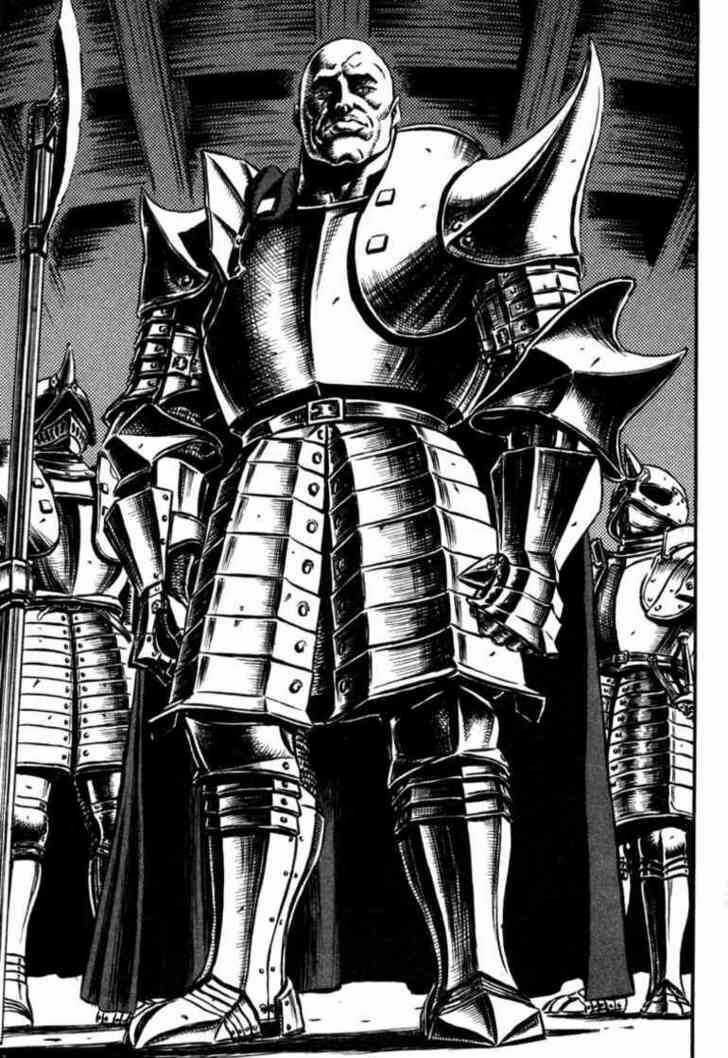TheItCrOw
Knight without Title
Boscogne is a side character in Berserk who received only little screentime, but nevertheless left a strong impression on me as he is one of my favourite characters in Berserk. Since I feel like he hasn't received the recognition he deserves in this forum (except for this bizarre thread from 2006 - nevermind, that thread was about someone called "Boscone"), I'd like to shed some light unto the infamous leader of the Holy Purple Rhino Knights.
(This post also contains speculations which I'm happy to have discussed and/or corrected should they be deemed false. Also, spoilers ahead.)
("Boscogne" is probably correctly spelled "Boskone")

About(This post also contains speculations which I'm happy to have discussed and/or corrected should they be deemed false. Also, spoilers ahead.)
("Boscogne" is probably correctly spelled "Boskone")

Boscogne made his first appearance in Episode 22, at the end of the Campfire of Dreams story. He is a general and leader of Tudor's strongest knight army: the Holy Purple Rhino Knights. As such, he fights on horse and wears armor which fits the title. His weapon of choice is the Bardiche, which is an intriguing choice (more to that later). Boscogne dies in Episode 27 through the hands of Guts.
Knight without Title
(As Aazealh pointed out: The english translation is wrong, which weakens the analysis of these self-descriptions. I still think the outcome of this section is valid as it fits to Boscogne. We don't have much to go off in the first place, so why not imagine a bit.)
We don't know much about Boscogne's history and himself in general. He referred to himself as "no more than a man of arms" which is an interesting self-description. The terms "Man-at-arms" and "Knights" were often used interchangeably, but while all knights equipped for war were men-at-arms, not all men-at-arms were knights. This is due to the fact that a fully armoured cavalryman could have been of lesser social status than a knight. Referring to himself as no-more than a man of arms, whilst being the leader of the Purple Rhino Knights, could be an indication that he is not of royal or noble status, but rather a knight without title who received his knighthood through military service and valor in battle.
Miura may have also indicated this to us through the interaction between Boscogne and Adon Coborlwitz, who is often referred to as "Sir Adon" and, as he himself expressed often enough through his secret techniques, is of the Coborlwitz family which is ever lasting since 700 years, hence indicating that Adon inherited his knighthood instead of actually earning it. In the course of their interaction, Adon displays a lack of concern for the men, including his own brother, whom he has just led to their demise. In contrast, Boscogne reacts with outrage and disgust at Adon's behavior, highlighting the contrasting perspectives of individuals with commoner origins and those from the nobility regarding the value attributed to common people and ordinary soldiers.
Strength
Boscogne was incredibly strong to the point where even some readers raised the questions whether he was an Apostle in disguise, which is obviously not the case - but it demonstrates his strength. He was able to fight on par with Guts which places him as one of the strongest humans we know in Berserk. Whilst doing so, he was able to slash three soldiers in half, similar to what Guts does.
His weapon: The Bardiche

As I've already alluded to, I find his weapon very intriguing. The bardiche is a type of polearm with a length of 4 to 5 feet that originated in Eastern Europe and was commonly used by infantry soldiers. The weapon requires strength and dexterity to wield effectively. Boscogne is the only one to use this weapon, whereas the rest of the Rhino Knights seem to use halberds which differ from the bardiche in having a hook at the back and a spear-point at the top. The bardiche was especially popular among the armies of Russia, Poland, and Ukraine, which led to one of the key battles the bardiche was used in: the Battle of Grunwald in 1410.
Battle of Grunwald
(Let's fantasize here for a moment to find General Boscogne in our very own history books.)
The Battle of Grunwald, also called the First Battle of Tannenberg, was fought during the Polish-Lithuanian-Teutonic War and was one of the largest battles in medieval europe and is commonly viewed as one of the most important victories in the history of Poland and Lithuania. In it, the catholic Teutonic Order was decisively defeated which eventually completly shifted the balance of power in Central Europe. The Teutonic order never recovered from this loss and most of the Order's leadership was killed that day.
Ulrich von Jungingen, the leader of the Teutonic Order, was known for his arrogant and provocative policy towards the Grand Duchy of Lithuania and the Kingdom of Poland which would initally spark the Polish-Lithuanian-Teutonic war and utlimately lead to the end of the Teutonic Order. He was hence known for his hot-bloodedness, arrogance and selfishness.
By the bardiche alone, I discerned the links among the Holy Purple Rhino Knights of the Tudor Empire, helmed by a haughty and self-centered leader. They faced the loss of their supposedly "impregnable" fortress, Dodlrey, along with their mightiest and most notorious general, Boscogne. This sequence of events ultimately culminated in the conclusion of the hundred-year war and the defeat of the Tudor Empire.
Although this connection may not align with what Miura had intended, it is the association I personally make with the bardiche and Boscogne.
Boscogne was a charismatic, mighty, loyal and honorable general, who deserved better leadership than he had gotten. As Miura introduced later, and @Aazealh beautifully explained here, the concept of Daimons may have resulted in Boscogne, as a hero from the Golden Age, riding into battle again. However, with Miura's passing, I've lost all hope for that to occur.
Last edited:





